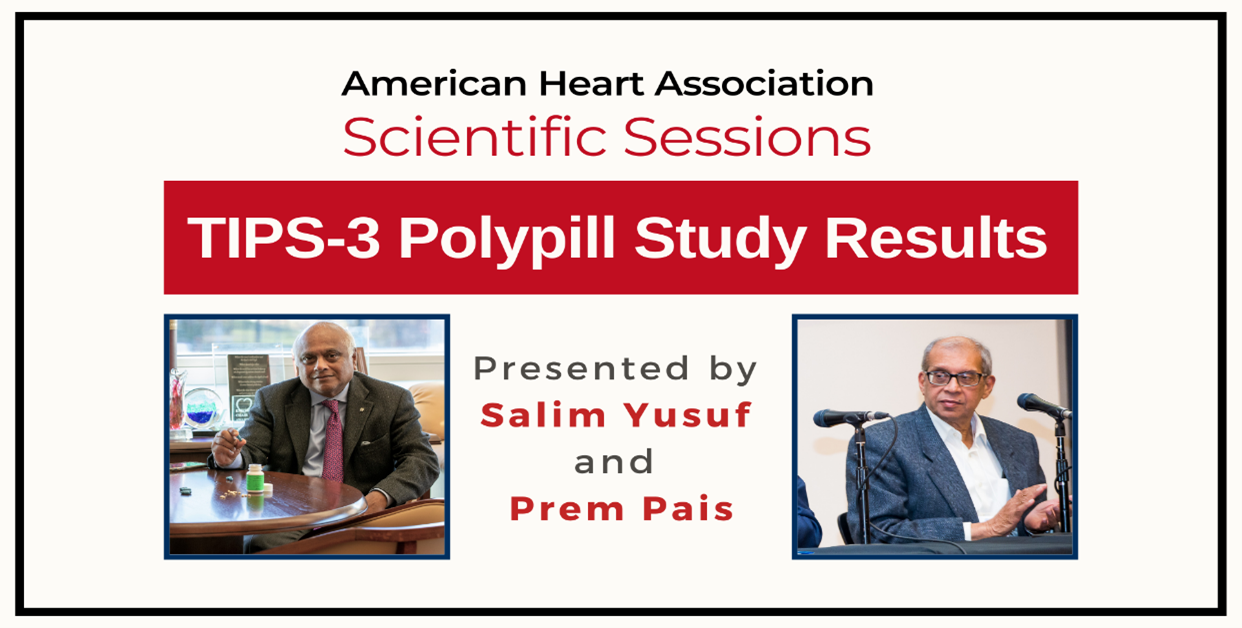Nov
13
Polypill along with aspirin cuts heart attacks and strokes by up to 40%: International study (TIPS-3)
Nov 13,2020
Heart attacks, strokes and other cardiovascular incidents can be cut by 20 to 40 percent through use of a polypill which combines three blood pressure and a lipid-lowering medications taken alone or with aspirin.
An international study of people with no previous heart disease or stroke, but at intermediate risk, found the polypill alone may reduce the risk of heart attack, stroke, revascularization procedures (such as angioplasty or heart surgery), or other cardiovascular incidents by about 20 percent, and the combination of the polypill and aspirin may reduce those cardiovascular events by up to 40 percent.
“This is the start of a transformational approach to preventing heart disease. We could save millions of people from experiencing serious heart disease or stroke each year with effective use of the polypill and aspirin,” said Salim Yusuf, co-principal investigator for the study and a professor of medicine at McMaster University in Canada.
As the most common serious illness globally, cardiovascular diseases account for about 18 million deaths each year, with more than 80 percent of those in low-income and middle-income countries. More than 40 million people around the world are impacted by cardiovascular events each year if those who recover from a heart attack or stroke are included.
“A polypill is not only effective, it is likely to be cost-effective since it is based on using commonly used generic drugs,” said Prem Pais, co-principal investigator of the study and professor of St. John’s Medical College and Research Institute in Bangalore, India. “A polypill is convenient for patients to use as it combines several effective drugs in a single pill and is taken once a day, which would be expected to improve adherence.”
The study was conducted in 89 centres from nine countries and coordinated globally by the Population Health Research Institute (PHRI), a joint institute of McMaster University and Hamilton Health Sciences. The Division of Clinical Research & Training (DCRT), St. Johns Research Institute was the National Co-ordinating Office in India.
“India contributed 2739 participants from 38 centres. Furthermore, investigators in India also participated in the TIPS-1 & TIPS-2 studies. Thus we from India played a significant role in the evaluation of the polypill”, said Dr. Denis Xavier, Professor of Dept of Pharmacology, St. Johns Medical College & Research Institute, Bangalore, National Co-ordinator & Co-PI for India.
“In addition to stopping smoking, the most modifiable risk factors for cardiovascular disease are high blood pressure and elevated cholesterol, so we wanted to test a polypill along with aspirin, which has proven value in people with established vascular disease,” said Yusuf, who is executive director of PHRI and a cardiologist at Hamilton Health Sciences.
The study has been published in NEJM (Polypill with or without aspirin in persons without cardiovascular disease; Salim Yusuf, Philip Joseph, Antonio Dans, Denis Xavier, Courtney Christou, Preeti Girish, Freeda Xavier, Jackie Bosch, Prem Pais et al; New England Journal of Medicine; 2020/11/13; 384(3); 216-228) and the co-principal presented the study’s results at the 2020 American Heart Association scientific sessions.
